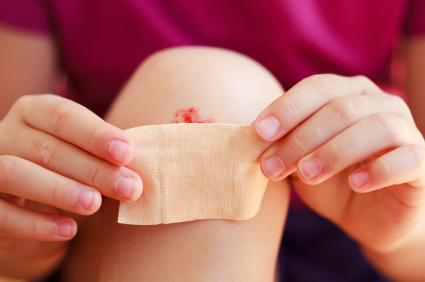

Traumatic injuries, like falls or car crashes, can cause the victim to lose a lot of blood very quickly. The result is thousands of preventable deaths per year, especially among Americans under age 44, for whom injury is the leading cause of death. Researchers at the University of Washington have developed an injectable material that can help blood clot faster and more effectively, plugging up the wound to stop the bleeding. The study was published today in the journal Science Translational Medicine.
When you get a cut, your body hurries to stop the leaking to keep the blood in and the nasty bacteria out. Platelets in your blood gather more cells around the wound, creating a mass that is then bound together by a strand-like protein called fibrin. Normally, the clot dries and becomes a scab as the body heals by rebuilding the lower layers of skin. But if the wound is too large, or if clots can’t form fast enough, blood loss can put a person’s life in danger.
The researchers, from the University of Washington, created a synthetic material that can be injected when a person is losing a lot of blood. The material, PolySTAT, mimics the body’s enzyme Factor XIII, which helps the fibrin strands cement a blood clot. The researchers tested PolySTAT on a small amount of blood and found that it clotted much more quickly and effectively with PolySTAT; in a separate test on rats that had a major wound in an artery, the researchers found that the rats that didn’t receive an injection of PolySTAT lost 11 times more blood than did the treated rats.
At the moment, there are lots of other ways that medical professionals can stop excessive bleeding. They can put pressure on a wound, seal it up with gel, give a patient a blood transfusion or a different sort of injection that uses nanoparticles to clog up the hole. One method even uses tiny sponges to clog up a wound. But for injuries where pressure doesn’t work, many of the current solutions require specific storing conditions, are very expensive, or clot too weakly to completely stop the bleeding. PolySTAT, its creators say, is hardier both inside and outside the body. The researchers plan to test PolySTAT’s effectiveness with organ damage and find other medical uses for polymers like this one.
